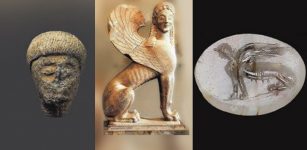Why Did Ancient Romans Cut Off Their Thumbs?
Conny Waters – AncientPages.com – Can you come up with a reason why you would deliberately remove your healthy thumbs? Ancient Roman males believed they had had a good cause to cut off their thumbs.
To understand their motivation for damaging their hands one must first realize that life in the ancient Roman Empire could be very difficult not just for children and women, but also for men regardless of status.
Credit: Public Domain
A rich and powerful Roman male could enjoy delicious food, parties, a variety of entertaining activities, and everything good life had to offer, but his comfortable living could easily turn into a nightmare if he decided to cut off his thumbs.
So, why would anyone want to deliberately want to damage his hands? Inquiring one’s body on purpose sounds crazy, but Roman males knew they were forced to damage their fingers to avoid military service.
The Roman Empire was vast and powerful, but to achieve glory and greatness it depended on its strong military machinery to defend its borders and conquer new lands.
Being a soldier in the Roman Empire was a challenge. Not only was military training very demanding, but you could also expect to be away from your home and loved ones for long periods. Men who wanted to avoid being recruited to the Roman Army cut off their thumbs because then they wouldn’t be able to hold and use a sword.
See also:
Attila The Hun: The Destroyer Of Rome Among Most Fearsome Enemies The Empire Ever Faced
Vercingetorix: Greatest Of All Gallic Leaders And Hero Of The French People
What Was Legio Martia And Why Were The Roman Soldiers Called The Martians?
Fascinating Ancient History Of Roman Shields
The punishment for cutting off a thumb could be severe even if you were a member of the aristocracy. Historical records tell Emperor Augustus was furious when he learned a rich man had cut off his sons’ thumbs so they could avoid conscription. These two young men were sold as slaves and all the possessions of the rich father were confiscated.
Five European Barbarian tribes hated and wanted to destroy Rome. These were the Huns, Franks, Vandals, Saxons, and Visigoths (Goths) and they destroyed many Roman towns and cities. The Romans had to respond and the Empire was in great need of skilled soldiers who could hold off the Barbarian invasion, but many men refused to be recruited to the army.
In time, the punishments for avoiding conscription became even harsher than before, and it wasn’t uncommon to witness men being burned at the stake in public. It was simply impossible to refuse to be a Roman soldier. If you did you could be executed.
The ancient Roman Empire was huge and had many enemies. Credit: Public Domain
“The Romans required at least 20,000 new recruits just to replace the losses to the field army after Adrianople, and these men would not have been easy to find.98 This is especially true due to the difficulties in recruitment that existed in the late fourth century.
Speaking on the character of the Gauls in 355 Ammianus writes, “no one here ever cuts off his thumb to escape military service, as happens in Italy, where they have a special name for such malingerers (murci).”
Additional law codes indicate the problems with recruitment in Italy likely permeated much of the empire.
In 364, Valentinian and Valens issued a law reconfirming the previous law established by Constantine that the sons of soldiers must serve in the military.
The next year an additional law was issued stating that if a person of low status helped a deserter then he would be sent to the mines and if a high status individual helped a deserter then he would be fined half of his total property.
A third law issued in 368 stated that “if a person cuts off his fingers to avoid military service he will be sentenced to death and if his master fails to prevent him from this he will be severely punished.” 1
Written by Conny Waters – AncientPages.com Staff Writer
Copyright © AncientPages.com All rights reserved. This material may not be published, broadcast, rewritten or redistributed in whole or part without the express written permission of AncientPages.com
Expand for referencesMore From Ancient Pages
-
 A 500-Year-Old Stolen Copy Of da Vinci’s “Salvator Mundi” Painting – Found By Italian Police
News | Jan 20, 2021
A 500-Year-Old Stolen Copy Of da Vinci’s “Salvator Mundi” Painting – Found By Italian Police
News | Jan 20, 2021 -
 Scientists Investigate – Did The Human Brain Shrink 3,000 Years Ago?
Human Beginnings | Aug 6, 2022
Scientists Investigate – Did The Human Brain Shrink 3,000 Years Ago?
Human Beginnings | Aug 6, 2022 -
 Kallikantzaroi: Naughty Nocturnal Goblins Emerge From Underground Only During Twelve Days Of Christmas
Ancient Traditions And Customs | Jan 3, 2025
Kallikantzaroi: Naughty Nocturnal Goblins Emerge From Underground Only During Twelve Days Of Christmas
Ancient Traditions And Customs | Jan 3, 2025 -
 Never-Before-Seen Ancient Texts Hidden In Saint Catherine’s Monastery In Sinai Are Now Available Online
Archaeology | Dec 21, 2017
Never-Before-Seen Ancient Texts Hidden In Saint Catherine’s Monastery In Sinai Are Now Available Online
Archaeology | Dec 21, 2017 -
 Mysterious Cave Of Prophetess Cumaean Sibyl – Ancient Portal To The Underworld
Featured Stories | Dec 25, 2017
Mysterious Cave Of Prophetess Cumaean Sibyl – Ancient Portal To The Underworld
Featured Stories | Dec 25, 2017 -
 Babylonian Conquest Of Jerusalem As Told In The Bible – Evidence Found In Mount Zion
Archaeology | Aug 16, 2019
Babylonian Conquest Of Jerusalem As Told In The Bible – Evidence Found In Mount Zion
Archaeology | Aug 16, 2019 -
 Warming Of North Pacific Helped First Human Migration From Asia To North America
Archaeology | Dec 15, 2020
Warming Of North Pacific Helped First Human Migration From Asia To North America
Archaeology | Dec 15, 2020 -
 Monstrous Nomoli Figures Left By Unknown Culture That Vanished Long Ago
Artifacts | Mar 13, 2023
Monstrous Nomoli Figures Left By Unknown Culture That Vanished Long Ago
Artifacts | Mar 13, 2023 -
 Stone Tools Reflect Three Waves Of Migration Of The Earliest Homo Sapiens Into Europe
Archaeology | May 4, 2023
Stone Tools Reflect Three Waves Of Migration Of The Earliest Homo Sapiens Into Europe
Archaeology | May 4, 2023 -
 Surprising Discovery Of Ancient Silver Coin Depicting Viking King Harald Hardrada In Hungary
Archaeology | Jun 20, 2022
Surprising Discovery Of Ancient Silver Coin Depicting Viking King Harald Hardrada In Hungary
Archaeology | Jun 20, 2022 -
 On This Day In History: Statue of Liberty Arrived In New York Harbor – On June 17, 1885
News | Jun 17, 2016
On This Day In History: Statue of Liberty Arrived In New York Harbor – On June 17, 1885
News | Jun 17, 2016 -
 Rare Sphinx Seal Belonging To Roman Emperor Discovered In India Confirms Existence Of Legendary Muziris
Archaeology | Oct 1, 2020
Rare Sphinx Seal Belonging To Roman Emperor Discovered In India Confirms Existence Of Legendary Muziris
Archaeology | Oct 1, 2020 -
 Queen Marie Antoinette’s Silk Shoe Auctioned In Versailles
Artifacts | Nov 17, 2020
Queen Marie Antoinette’s Silk Shoe Auctioned In Versailles
Artifacts | Nov 17, 2020 -
 Nammu: Sumerian Goddess Who Got The Idea To Create Mankind In The Image Of Gods
Featured Stories | Apr 1, 2019
Nammu: Sumerian Goddess Who Got The Idea To Create Mankind In The Image Of Gods
Featured Stories | Apr 1, 2019 -
 On This Day In History: ‘Sea King’ Ragnar Lodbrok Seizes Paris – On March 28, 845
News | Mar 28, 2017
On This Day In History: ‘Sea King’ Ragnar Lodbrok Seizes Paris – On March 28, 845
News | Mar 28, 2017 -
 Stunning Gold Jewelry And Artifacts From The Time Of Nefertiti Found In Bronze Age Tombs In Cyprus
Archaeology | Dec 2, 2021
Stunning Gold Jewelry And Artifacts From The Time Of Nefertiti Found In Bronze Age Tombs In Cyprus
Archaeology | Dec 2, 2021 -
 CT Scanning And 3D-Modelling Used To ‘Unfold’ Ancient Silver Plate Found In Jerash
Archaeology | Dec 26, 2015
CT Scanning And 3D-Modelling Used To ‘Unfold’ Ancient Silver Plate Found In Jerash
Archaeology | Dec 26, 2015 -
 First Genome-Wide Ancient Human DNA From Sudan Shines New Light On Nile Valley Past
Archaeology | Dec 20, 2021
First Genome-Wide Ancient Human DNA From Sudan Shines New Light On Nile Valley Past
Archaeology | Dec 20, 2021 -
 Has The Mystery Of Bronze Age Tin Been Solved?
Archaeology | Oct 3, 2019
Has The Mystery Of Bronze Age Tin Been Solved?
Archaeology | Oct 3, 2019 -
 Rare Neolithic Underwater Textiles And Dwellings Discovered At La Marmotta Near Rome
Archaeology | Jun 6, 2023
Rare Neolithic Underwater Textiles And Dwellings Discovered At La Marmotta Near Rome
Archaeology | Jun 6, 2023


